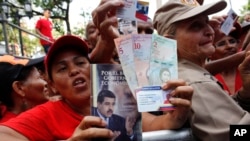Venezuelan authorities on Monday approved a new, privately-run foreign exchange system that will operate in parallel to the official currency control system, as an emboldened opposition challenges President Nicolas Maduro.
The currency controls, originally created by late socialist leader Hugo Chavez in 2003, have sold dollars at an advantageous rate for basic goods while at times also selling hard currency for other items at a less favorable rate.
Critics call the currency controls one of the principal distortions of the crisis-stricken economy, which is expected to see inflation reach 10 million percent this year amid a broad collapse that has fueled a humanitarian crisis. With prices doubling every few weeks, cash is scarce and even the smallest transactions are carried out with debit cards.
"The system will not correct the distortion," Henkel Garcia, a director of local consultancy Econometrica. "The country's most serious problem is the inadequate supply of dollars."
The announcement comes as opposition leader Juan Guaido seeks to pressure the government and hold new elections, a push that has won widespread support overseas. Guaido has proclaimed himself president due to what he says was a fraudulent vote leading to Maduro's re-election last year.
Maduro says the United States is promoting a coup against him and promised to stay in office, backed by Russia and China.
The new currency platform, called Interbanex, began operations on Monday, selling dollars at 3,200 bolivars, it said on Twitter. That rate is 34.5 percent weaker than the official rate of 2,084 bolivares to the dollar.
Venezuela's central bank said on Twitter that Interbanex "will become part of the country's currency exchange market," and that it was authorized by the Finance Ministry.
The central bank did not respond to a request for comment. Manuel Armas, a spokesman for Interbanex's customer service department, said Venezuela's state institutions would not participate for now due to U.S. sanctions on Maduro's government.
Interbanex also said that private Venezuela bank BOD would trade on the platform. BOD did not immediately respond to a request for comment.
The ruling Socialist Party has over the years launched six "complementary" foreign exchange systems meant to improve access to dollars, but those systems all collapsed amid complaints by businesses that they could not obtain the greenbacks they needed.
On its Twitter page, Interbanex says it is owned by "Spanish investors" and on its website it lists its owner as Interban Exchange. Interban is owned by a Granada, Spain-registered company called Ampajesu and a Barbados-registered company called Bull Equity Management, according to Interbanex.





